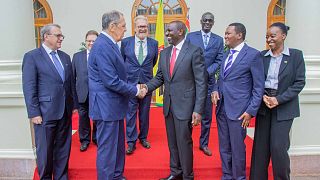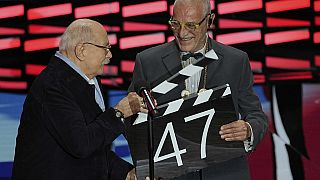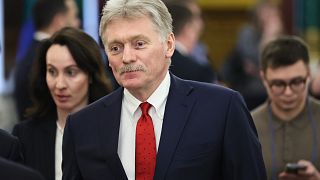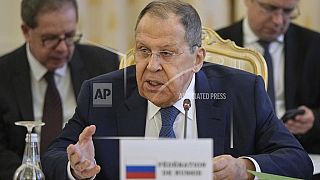Russia
Two days after the deal enabling export of Ukrainian grain through the Black Sea was prolonged, Russia's president gave guarantees to his African partners.
Vladimir Putin spoke Monday (Mar. 20) at the second International Parliamentary Conference "Russia-Africa".
According to the UN, 55% of the total amount of grain exported under the deal since July went to developing countries.
"If we nevertheless decide not to renew this deal after 60 days, then we are ready to deliver all the volume that was sent to the countries in Africa, in particular in need, during the previous period from Russia to these countries free of charge," the president of the Russian Federation said.
The deal known as the Black Sea Initiative is backed by the UN- and endorsed by Turkey. It was signed last July. It includes a Memorandum of Understanding between Russia and the UN to ease fertiliser exports.
Last week, Russia insisted on reducing the duration of the deal from an initial 120 days to 60 to hold out for changes on how the package is working.
Is the deal fully implemented?
Under the initiative, U.N. Undersecretary-General for Humanitarian Affairs Martin Griffiths said, close to 25 million metric tons of foodstuff have been exported since last August, and the U.N. World Food Program has been able to transport more than half a million metric tons of wheat to support humanitarian operations in Afghanistan, Ethiopia, Kenya, Somalia and Yemen.
Griffiths also said it’s vital for the U.N.-Russia memorandum to be fully implemented.
There has been "meaningful progress, but impediments remain, notably with regard to payment systems," he said, stressing that U.N. Secretary-General Antonio Guterres and trade chief Rebeca Grynspan "are sparing no effort to facilitate its full implementation."
But Russia’s ambassador to the U.N Vassily Nebenzia said "the memorandum is simply not working," and the U.N. has to recognize it has "no leverage to exempt Russian agricultural export operations from Western sanctions" and its efforts have not produced results.
He also claimed that the Ukraine grain export deal had been transformed from a humanitarian initiative to help developing countries facing escalating food prices to a commercial operation benefiting the world’s four leading Western agro-business corporations.
"If Brussels, Washington and London are genuinely interested to continue the export of food from Ukraine through the maritime humanitarian corridor, then they have two months to exempt from their sanctions the entire chain of operations which accompany the Russian agricultural sector," the Russian envoy said.
"Otherwise, we fail to understand how the package concept of the secretary-general of the United Nations will work through these simple agreements," he said.
U.S. Ambassador Linda Thomas-Greenfield countered saying that that Russia’s food exports are at least as high as their pre-war levels, and "when we hear the Russian government say they are being held back from exporting grain, from exporting fertilizer, the numbers show it’s just not true."
When it comes to sanctions, "we have gone to extraordinary lengths to communicate the clear carveouts for food and fertilizer to governments and to the private sector," she said. "Simply put, sanctions are not the issue."












Go to video
Zelenskyy cuts short visit to South Africa after deadly Russian strike on Kyiv
01:16
Africa mourns Pope Francis, a voice for peace and justice
01:14
ECOWAS Meets in Ghana to Tackle Member Withdrawals
Go to video
EU foreign ministers discuss Ukraine, Syria and EU-African relations in Luxembourg.
01:58
Latin American leaders urge unity amid U.S. trade and migration tensions
Go to video
Paris hosts the 4th edition of African Cinema Days featuring Côte d'Ivoire